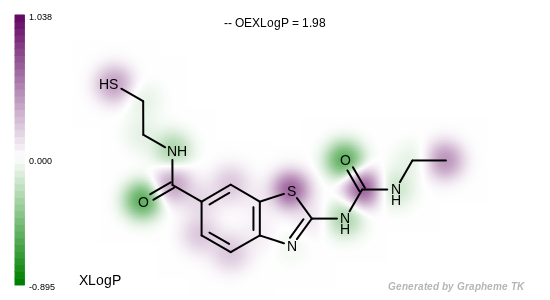OEGetXLogPResult
Returns an OEXLogPResult object. The object contains
the XLogP for the given molecule as described in the LogP
section and a boolean flag indicating whether or not the computation is
valid. The main reason the computation may fail is if one or more atoms
are not parameterized. The returned value will be equal to the sum on the
individual atom contributions plus the linear regression
constant -0.127.
Hint
XLogP should be calculated on the neutral form of the molecule.
Therefore, calling the OERemoveFormalCharge function
of Quacpac TK is highly recommended prior to the XLogP calculation.
The atomxlogps parameter can be used to retrieve the contribution
of each atom to the total XLogP as shown in
Listing 2.
See example in Figure: Example of depicting the atom contributions
of the XLogP.
This function exists to make the calling by wrapped languages more
convenient. This function should be preferred over the original
OEGetXLogP function for wrapped languages.
Listing 2: Example of retrieving individual atom contributions to XLogP
float[] atomXLogP = new float[mol.GetMaxAtomIdx()];
OEXLogPResult result = new OEXLogPResult(OEMolProp.OEGetXLogPResult(mol, atomXLogP));
if (result.IsValid())
{
Console.WriteLine("XLogP = " + result.GetValue());
foreach (OEAtomBase atom in mol.GetAtoms())
{
uint idx = atom.GetIdx();
Console.WriteLine("{0:d} {1:0.00}", idx, atomXLogP[idx]);
}
}
else
Console.WriteLine("XLogP failed for molecule");

Example of depicting the atom contributions of the XLogP
See also
OEXLogPResult class LogP section
Code Example
Depicting Atom Contributions of XLogP OpenEye Python Cookbook recipe
Depicting Fragment Contributions of XLogP OpenEye Python Cookbook recipe